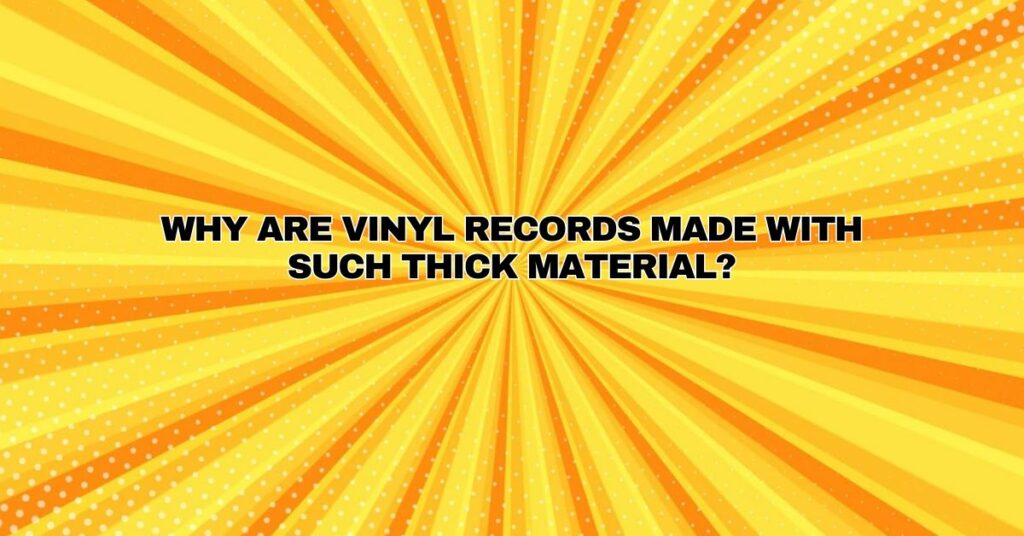In the midst of the digital age where music can be streamed and downloaded at the touch of a button, the resurgence of vinyl records is a compelling testament to the enduring allure of analog sound and physical media. A topic of perennial discussion within the vinyl community is the thickness of vinyl records, with many enthusiasts favoring thicker records, such as 180g vinyl. In this comprehensive article, we will explore the reasons behind the choice of thicker vinyl, the impact on audio quality, and the historical and practical aspects that have contributed to its popularity.
The Quest for Durability
One of the primary motivations for using thicker vinyl in the production of records is durability. Thicker vinyl records, like 180g or even heavier variants, offer enhanced structural stability and resistance to warping and damage. This durability is particularly important for vinyl records, as they are prone to physical wear and tear through handling, repeated playback, and exposure to environmental factors like temperature and humidity.
The thicker vinyl material is inherently more rigid, making it less prone to warping, which can distort the grooves and negatively impact sound quality. For record collectors and audiophiles, the assurance of a durable record that can withstand the test of time is highly appealing.
Enhanced Sound Quality
While thickness alone does not guarantee superior audio quality, many audiophiles perceive that thicker vinyl records can result in better sound. The rationale behind this perception lies in the increased stability and rigidity that thicker vinyl offers.
Thicker records provide a more substantial and stable groove for the turntable stylus to track. This improved tracking can lead to reduced distortion and a cleaner, more accurate playback. Thicker vinyl may also contribute to reduced surface noise, enhancing the overall listening experience. However, it’s crucial to note that audio quality is influenced by various factors, including the mastering process, the quality of the pressing, and the playback equipment.
Historical and Audiophile Appeal
The resurgence of vinyl records has seen a rise in the demand for audiophile-quality pressings. Audiophile editions of albums are typically produced using thicker vinyl and are meticulously mastered and pressed to ensure the highest audio fidelity. These premium editions are often limited in quantity, highly sought after by collectors, and cherished for their superior sound quality.
Thicker vinyl has historical roots in the audiophile world, as it has been used for decades to cater to the demands of discerning listeners who prioritize audio quality above all else. Audiophiles often turn to thicker vinyl as a sign of commitment to excellence in sound reproduction.
Stylus Compatibility and Tracking
The use of thicker vinyl records may necessitate adjustments to the turntable’s tonearm, counterweight, and stylus pressure. The stylus, or needle, must maintain proper contact with the grooves to ensure accurate tracking. The increased thickness of the record can influence the tracking force, which should be calibrated according to the manufacturer’s recommendations to avoid damage to the stylus or the record itself.
Some turntables feature adjustable tonearms that can accommodate various record thicknesses, making it easier for users to switch between standard and heavyweight vinyl.
Practical Considerations
Thicker vinyl records come with practical considerations for collectors and enthusiasts:
- Sleeve and Storage: Thicker records may require larger, heavyweight sleeves for protection against dust and damage. Proper storage and handling are essential to preserve the quality of the vinyl.
- Collectibility: Thicker records are often associated with limited or audiophile editions and can be highly collectible. Many collectors seek out these premium pressings for their intrinsic and perceived value.
In Conclusion
The preference for thicker vinyl records, such as 180g or more, is motivated by a combination of factors that include durability, potential sound quality benefits, historical appeal, and practical considerations. While thicker vinyl is not a guarantee of superior audio quality, it is a testament to the enduring passion of vinyl enthusiasts and collectors. Whether you prioritize the longevity of your records, the quest for pristine sound, or the allure of collectible editions, the world of vinyl records offers a variety of thickness options to satisfy your musical and audiophile pursuits.


